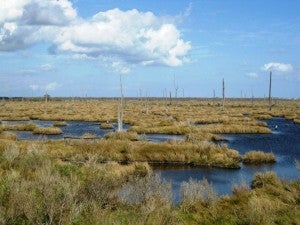A Decade after Katrina, Groups Issue Recommendations for Community Protection, Restoration
FOR IMMEDIATE RELEASE
Contact:
Samantha Carter, National Wildlife Federation, 504.264.6831, carters@nwf.org
Emily Guidry Schatzel, National Wildlife Federation, 225.253.9781, schatzele@nwf.org
Raleigh Hoke, Gulf Restoration Network, 573.795.1916, raleigh@healthygulf.org
A Resilient, Sustainable New Orleans
A Decade after Katrina, Groups Issue Recommendations for Community Protection, Restoration
(New Orleans – August 11, 2015) To commemorate the upcoming 10th anniversary of Hurricane Katrina, a coalition of local community and conservation advocacy groups working to restore wetlands around the Mississippi River Gulf Outlet (MRGO) released a new report today.
The MRGO Must Go Coalition’s report – titled “10th Anniversary of Katrina: Making New Orleans a Sustainable Delta City for the Next Century” – reflects on the progress that has been made since Hurricane Katrina and offers recommendations for ensuring the full protection and long-term resiliency of the Greater New Orleans communities, including implementing a “Multiple Lines of Defense Strategy” to protect coastal communities and wetland habitat.
In conjunction with the report release, members of the MRGO Must Go Coalition released the following statement today:
“Hurricane Katrina brought to the forefront the dire need to improve the resilience of New Orleans and its coastal neighbors. Katrina barreled onshore, churned through MRGO, and wreaked havoc in the Greater New Orleans area – showing us that levees alone are not enough to protect our people, natural resources and economy.
“Today, our coastline continues to disappear at the alarming rate of a football field every hour. As coastal wetlands wash away, with them go our natural defenses. Healthy wetlands and barrier islands serve as natural buffers, defending us against storms. Without slowing down this land loss crisis, we will continue to be vulnerable to storms, sea level rise and the growing risks of climate change.
“Ten years later, we have made great strides toward both restoration and protection. The closure of MRGO, the passing of the 2012 Louisiana Coastal Master Plan, the adoption of an Urban Water Plan and major upgrades to structural protections like levees and storm surge barriers are all true marks of progress for our region.
“However, the critical work to achieve protection and resiliency is really just beginning. We must continue to implement a Multiple Lines of Defense Strategy against storms – including community level planning and preparedness, urban storm water management, and protecting and restoring our coastal wetlands. We must build on the momentum of the last decade and continue to work to make New Orleans a model city for restoration, resiliency and sustainability.”
The MRGO Must Go Coalition was founded in 2006 in response to Hurricanes Katrina and Rita. The Coalition’s mission is to ensure that the wetlands affected by the MRGO are carefully restored in a timely manner. As of August 2015, the MRGO Must Go Coalition included 17 local and national environmental, social justice and community organizations.
Since its inception, the Coalition has served as a liaison between the communities in Orleans and St. Bernard parishes and the US Army Corps of Engineers and other government agencies. The vast organizational resources and expertise provided by the member organizations allow the Coalition to make informed policy and scientific recommendations on the restoration of the ecosystem impacted by the MRGO. More information can be found at www.MRGOmustGO.org.
###
